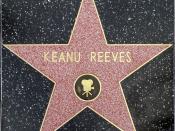There's no sophomore jinx for the Wachowski Brothers. Andy and Larry, a pair of obviously talented film makers, have returned to theaters with The Matrix, a science fiction thriller that is every bit the match of their debut effort, Bound, for tension, excitement, and intelligence. In an era when movie scripts (especially those pigeonholed into the science fiction genre) are becoming increasingly more stupid and special effects reliant, the Wachowskis prove that style and substance do not have to be mutually exclusive.
I loved The Matrix, and only a few minor contrivances associated with the climax caused the film to miss a four-star rating. The movie is kinetic, atmospheric, visually stunning, and mind-bending. It toys with the boundaries between reality and fantasy in unique and interesting ways. In its approach and content, it reminded me of last year's vastly underrated Dark City. There's also a synergy with two movies due to be released within the next month: David Cronenberg's eXistenZ and Alejandro Amenabar's Open Your Eyes.
The Matrix is undeniably science fiction, but, unlike most pictures claiming that association, it never falls into the boring, expected patterns of space battles and laser gun shoot-outs. Instead, it ventures into territory that, while not virgin, is sufficiently interesting to provide an involving, invigorating backdrop.
Thomas Anderson (Keanu Reeves) is leading a double life. To most people, he's a hard-working computer programmer who holds down a nine-to-five job for a major software corporation. But, in the privacy of his home, he's a hacker named Neo who is "guilty of virtually every computer crime [there's] a law for." Neo is dissatisfied with his existence, and, while he's groping for a meaning to it, he is contacted by a mysterious computer presence known as Morpheus. "Wake up Neo," a printout on his...


